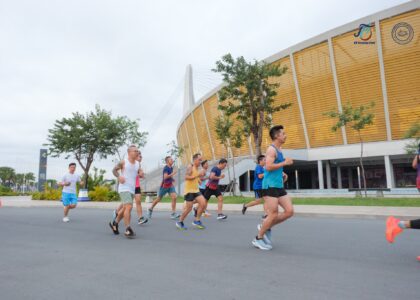Injury prevention and recovery are critical aspects of a runner’s overall training plan. Incorporating specific strategies can help reduce the risk of injuries and promote faster recovery. Here are essential tips for injury prevention and recovery for runners:
1. Proper Warm-Up:
Dynamic Stretching: Prioritize dynamic stretching before running to increase blood flow and flexibility. Include leg swings, high knees, and lunges.
2. Gradual Progression:
Increase Mileage Gradually: Avoid sudden spikes in training volume. Increase mileage by no more than 10% each week to allow your body to adapt.
3. Strength Training:
Core and Lower Body Strength: Incorporate strength training exercises focusing on the core, hips, and legs. This can improve stability and reduce the risk of common running injuries.
4. Cross-Training:
Variety in Workouts: Include activities like cycling, swimming, or yoga to give running muscles a break and enhance overall fitness.
5. Proper Footwear:
Regular Shoe Replacement: Replace running shoes regularly to ensure proper support and cushioning. Consult with a professional for proper shoe fitting.
6. Listen to Your Body:
Rest and Recovery Days: Include rest days in your training schedule to allow your body to recover. Pay attention to signs of fatigue and adjust your training accordingly.
7. Post-Run Nutrition:
Refuel with Protein and Carbs: Consume a balanced meal or snack with protein and carbohydrates within 30-60 minutes after running to support recovery.
8. Foam Rolling and Stretching:
Self-Myofascial Release: Incorporate foam rolling to release tight muscles. Include static stretching in your post-run routine.
9. Ice Baths and Compression:
Cold Therapy: Consider ice baths or cold packs for sore muscles. Compression garments may also aid in recovery by improving blood circulation.
10. Hydration:
Maintain Proper Hydration: Dehydration can lead to muscle cramps and increase the risk of injuries. Stay hydrated throughout the day.
11. Proper Running Form:
Biomechanical Analysis: Have a professional analyze your running form to identify and address any issues that may contribute to injuries.
12. Regular Check-ups:
Physical Exams: Schedule regular check-ups with healthcare professionals, including orthopedic specialists and physiotherapists, to address any emerging issues.
13. Sleep:
Prioritize Sleep: Ensure you get adequate sleep, as it plays a crucial role in recovery and overall performance.
14. Reduce Overtraining:
Listen to Fatigue Signals: Be aware of signs of overtraining, such as persistent fatigue, increased resting heart rate, and changes in mood.
15. Consult with Professionals:
Seek Professional Advice: If you experience persistent pain or injuries, consult with a physical therapist, sports medicine professional, or healthcare provider for proper diagnosis and treatment.
Remember, individual responses to training and recovery strategies can vary. It’s crucial to tailor these recommendations to your specific needs and seek professional advice when needed. Regularly reassess and adjust your training plan to support long-term health and running success.



